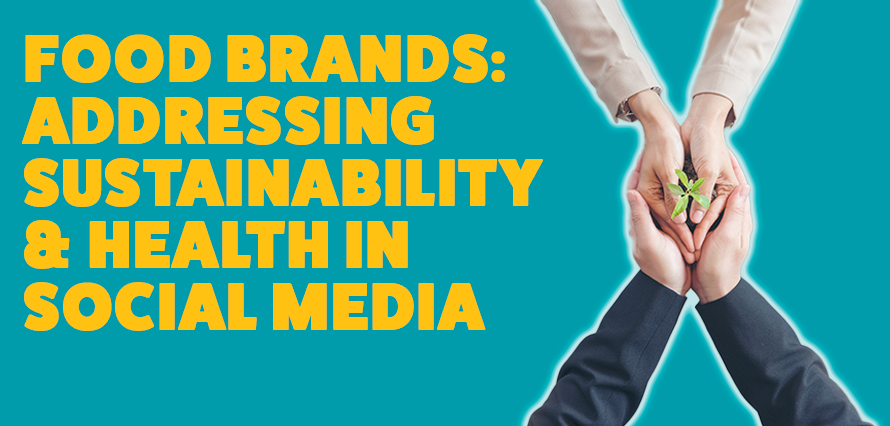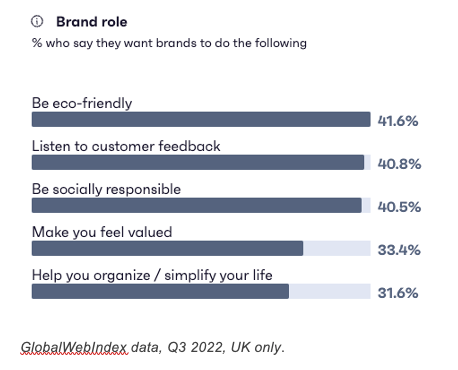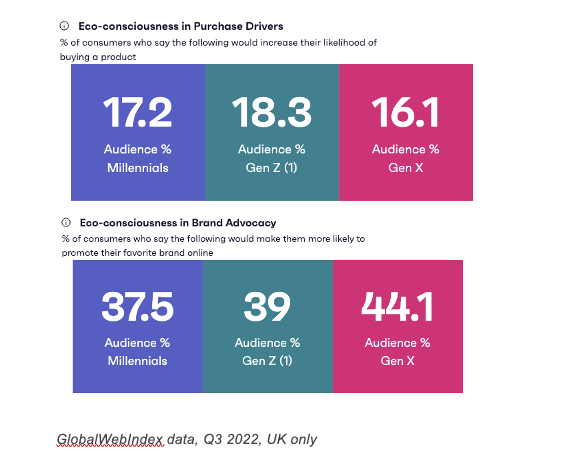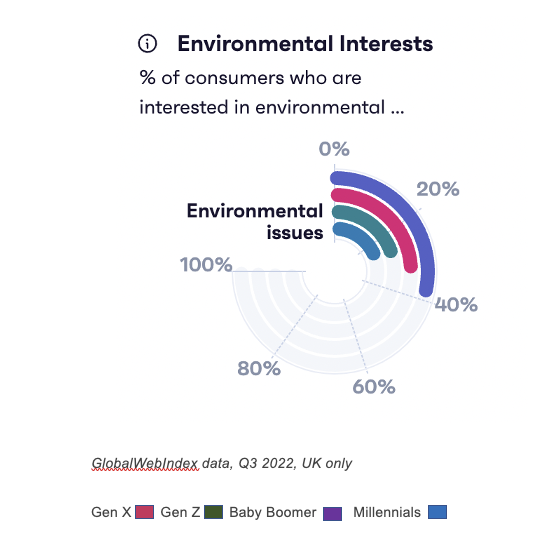January 16, 2023

Consumers are becoming more and more conscious of the impact of the food industry on the environment, animal welfare, and their health. According to a 2022 survey by YouGov, 60% of UK consumers are concerned about the environmental impact of the food they eat. As the demand for sustainable and healthier options rises, food brands must take proactive measures to address these concerns to establish a good reputation, lower expenses, and achieve long-term success. In this blog post, we will explore the best practices for using social media to promote sustainability and eco-conscious behaviour, and how it can help food brands attract and retain customers.
Critical Reasons Why Brands Should Embrace Sustainability
- According to data from GlobalWeb Index, UK consumers view being environmentally friendly as their top brand expectation, with 41% of them considering it to be important. Another 40% of UK consumers believe that brands have a moral obligation to be socially responsible.

- The adoption of sustainable practices greatly affects the level of support and loyalty towards a brand with 45% of UK consumers considering it to be an important factor

- Environmental concerns are considered important for all ages. Gen Z is often dubbed “Generation Green”, yet Baby Boomers are more inclined towards social responsibility and environmental issues when compared to other demographics. 39 % of the Baby Boomer population attaches importance to social responsibility and 38% are interested in environmental issues.

The Recent Trends in Sustainability within the Food Industry
- Sustainable packaging: More and more companies are looking to reduce the use of single-use plastics and customers are ready to pay for it. As per the Boston Consulting Group report, 74% of consumers are willing to pay more for sustainable packaging and one-fourth are willing to pay for an increased cost of 10% or more.
- Organic and local sourcing: Soil Association Certification’s Organic Market Report 2022 reveals the UK organic market is now worth a record £3.05 billion after a 5.2% growth in sales in 2021, with shoppers spending almost £60 million on organic products every week
- Regenerative agriculture: In early 2020, Whole Foods announced regenerative agriculture would be the No. 1 food trend and, in spite of the pandemic and the rapid growth of online shopping overshadowing the trend, business interest in the field still spiked by 138%.
- Food waste reduction: Many companies are taking steps to reduce food waste in their operations, whether by using surplus ingredients in new products or by donating unsold food to those in need.
- Climate labelling: Companies are starting to adopt climate labelling, which provides consumers with information about the carbon footprint of a particular product.
The Current Trends in Healthy Eating
- Plant-based diets: According to the Bloomberg Intelligence report, plant-based food will make up 7.7% of the global protein market by 2030, as its value rises to more than $162 billion.
- Functional foods: In a recent report by MarketsandMarkets, the global functional food market is projected to reach $137.1 billion by 2026, from $98.9 billion in 2021. These are the foods that have been developed to not just provide basic nutrition, but also have added health benefits such as probiotics, anti-inflammatory benefits from turmeric and ginger, and stress management through adaptogens like ashwagandha and reishi mushroom.
- Gut health: With the awareness of the importance of gut health and probiotics growing, the global probiotics market size is expected to expand at a compound annual growth rate (CAGR) of 7.5% from 2021 to 2030.
- Low-carb high-fat (LCHF) diets: This trend involves eating a low-carbohydrate, high-fat and moderate protein diet, which is believed to help with weight loss and improve overall health.
Steps Brands Should Take to Address Sustainability Issues and Promote Healthy Eating
- Communicate your commitment: Clearly communicate your commitment to sustainability and health on your social media channels. Share your brand’s values and mission about these issues, and let your customers know what you are doing to address them.
- Use visual content: Use visual content such as photos and videos to showcase your commitment to sustainability and health. For example, you can show how you are reducing food waste, or how your products are made using sustainable or organic ingredients.
- Share educational content: Share educational content on your social media channels, such as tips for reducing food waste at home, or the benefits of eating certain types of food for health.
- Highlight partnerships: Highlight any partnerships or collaborations your brand has with organizations that share similar values related to sustainability and health.
- Use influencers and brand ambassadors: Work with influencers and brand ambassadors who align with your brand values and mission related to sustainability and health.
- Be transparent: Be transparent about your sourcing, production, and distribution processes. Share information about where your ingredients come from, how they are produced, and how they are transported.
- Listen and engage: Listen to feedback from your customers, engage with them and respond to their comments and questions. Use social listening to understand what they are looking for and adapt your strategy accordingly.
- Use appropriate hashtags and keywords: Use appropriate hashtags and keywords to make it easier for customers to find and engage with your content related to sustainability and health.
As consumers are becoming more attentive to the environmental impact of the food they eat, food companies that take initiative in addressing these concerns and incorporate it in their promotional plans are more likely to be successful in attracting and retaining these customers. Contact us today if you want to identify the most effective social marketing strategy for your brand and always stay ahead of trends.